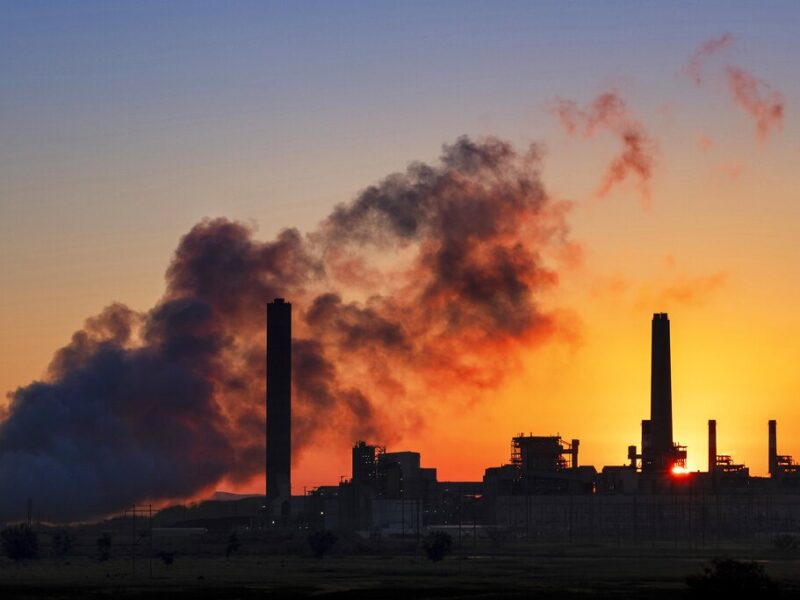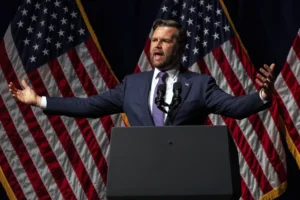Wyoming Leaders Denounce New EPA Power Plant Rules
Gov. Gordon decries ‘edicts from afar’
- Published In: Politics
- Last Updated: May 12, 2023

New rules released by the Biden administration on Thursday to regulate power plant emissions received fierce pushback from Wyoming officials. (AP Photo/J. David Ake, File)
By Jacob Gardenswartz
Special to the Wyoming Truth
WASHINGTON — New rules released Thursday by President Joe Biden’s Environmental Protection Agency (EPA) that aim to cut down on pollution from fossil fuel–fired power plants are sparking outrage in Wyoming, a state with deep ties to the coal, oil and gas industries.
The long-awaited standards, which will take effect in 60 days barring any legal challenges, amount to the first-ever attempt to regulate power plant emissions, the second-highest contributor to greenhouse gas pollution in the U.S. They also are among the most ambitious efforts by the Biden administration to blunt the impacts of climate change — and among the most vilified by the industries contributing to it.
“This administration is committed to meeting the urgency of the climate crisis and taking the necessary actions required,” EPA Administrator Michael Regan said, announcing the policy in a speech at the University of Maryland.
The proposed rules are crucial to “protecting health and protecting our planet,” Regan added, arguing they’d improve air quality, increase health outcomes and disproportionately benefit low-income and minority communities who have “unjustly borne the burden of pollution for decades.”
Though the toughest regulations will be implemented incrementally in the coming years, the EPA projects they would prevent up to 617 million metric tons of carbon dioxide being released into the atmosphere before 2042, the equivalent of removing nearly half of all the cars in the nation from the road. The agency claims they would also amount to an $85 billion in net savings due to their climate and health benefits, preventing some 1,300 premature deaths and 800 hospitalizations in 2030 alone.
Still, the rules could have drastic impacts on the nation’s power supply. Almost two-thirds of American electricity generated in 2022 came from burning coal or natural gas, according to the U.S. Energy Information Administration; less than a quarter of the output was from renewable sources like hydroelectric power or nuclear reactors.
The Equality State reaction: universal disapproval
In Wyoming and Washington, elected officials reacted with anger.
“One has to wonder if this Administration has their head in the sand to be so tone deaf,” Gov. Mark Gordon said in a statement. “Instead of encouraging states with diverse and ample energy sources to chart a course towards energy independence and economic diversity, this misinformed, conflicting, and altogether unworkable program ignores the essential role that carbon capture must play in a reliable energy future.”
Gordon went on to decry such “edicts from afar” as ones that would “destroy Wyoming jobs and communities.”
Such sentiments were echoed by Wyoming’s representatives in Washington and their Republican colleagues.
Sen. John Barrasso (R-Wyo.), ranking Republican on the Senate Energy and Natural Resources Committee, blasted the move in a Thursday statement. “Congress, not the EPA, has the authority to create environmental policy,” he argued. “The EPA’s new proposed rules would kill jobs in Wyoming and raise energy costs for families across the country.”
Sen. Cynthia Lummis (R-Wyo.), who called the policy a “full-frontal assault on the people of Wyoming,” went on to argue the new standards were “impossible to meet” and would “ultimately shut down coal and natural gas fired power plants, which will destroy good paying, American jobs and increase reliance on our adversaries.”
“This makes no sense,” Lummis concluded. Sen. Shelly Moore Capito (R-W.V.), the top Republican on the Senate Environment and Public Works Committee, meanwhile pledged to introduce a measure attempting to overturn the rule.
And it wasn’t just Republicans expressing disapproval. Sen. Joe Manchin (D-W.V.), the Senate Energy Committee Chairman with a long history of protecting fossil fuel and coal production, was blunt in his analysis.
“This Administration is determined to advance its radical climate agenda and has made it clear they are hellbent on doing everything in their power to regulate coal and gas-fueled power plants out of existence, no matter the cost to energy security and reliability,” Manchin said in a statement.
“I fear that this Administration’s commitment to their extreme ideology overshadows their responsibility to ensure long-lasting energy and economic security and I will oppose all EPA nominees until they halt their government overreach,” he concluded.
Environmentalists rejoice; industry rejects
In the advocacy sphere, groups supporting strong environmental protections and climate policies praised the announcement.
“Today marks a much-needed step forward in the effort to rein in climate pollution,” Abigail Dillen, president of Earthjustice, said in a statement.
“The EPA’s proposed rule sends an unequivocal signal to American power plant operators: the era of unlimited carbon pollution is over,” echoed World Resources Institute’s Dan Lashof.
But groups representing the fossil fuel industry trashed the proposed regulations.
According to Anne Bradbury, CEO of the American Exploration and Production Council — a group representing dozens of top oil and gas companies in the U.S. — “the primary reason that Americans have affordable and reliable electricity, and the U.S. leads the world in emissions reductions is because of the role that natural gas plays in our power sector.”
Rich Nolan, president and CEO of the National Mining Association, described the rules as “an onslaught” of government regulation “designed to shut down the coal fleet prematurely.”
But there is one industry that could benefit from the new policy: carbon capture.
The emerging — and thus far highly expensive — technology aims to reduce emissions not by switching to a renewable fuel source but by eliminating most or all of the pollutants released into the atmosphere when burning fossil fuels. Experts predict the new rules could spur even further development in that space, something which could be a boon to Wyoming — already a leader in domestic carbon capture projects.
Supreme Court to moot the rule?
As officials and industry representatives argue about the feasibility and impacts of the EPA policy, opponents hope to take the matter to the U.S. Supreme Court.
In a landmark 6-3 decision last year, the Court limited the EPA’s ability to regulate air pollution from power plants by ruling that the agency does have some authority to combat air pollution, but it can’t attempt to force a wholesale transition away from coal-generated electricity.
“A decision of such magnitude and consequence rests with Congress itself, or an agency acting pursuant to a clear delegation from that representative body,” Chief Justice John Roberts wrote for the majority.
Regan, in a Wednesday call with reporters, argued the new policy was not aimed to eliminate coal but instead “relies on proven, readily available technologies to limit carbon pollution.”
Still, some red state officials intend to force the matter in court.
“Last year, the Supreme Court threw out the Environmental Protection Agency’s (EPA) overreaching mandates on power plant emissions,” Barrasso said. “Nothing has changed since then to give the unelected and unaccountable bureaucrats at the EPA this authority.”













